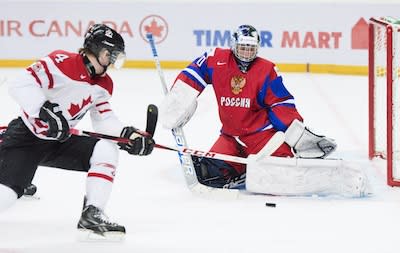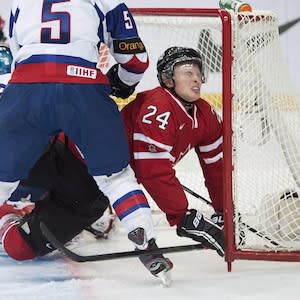World junior championship: Canada’s best through the round robin
So it's settled, then. Canada will face off against the Americans in the semifinal of the 2013 IIHF U-20 world championships, as the final four teams remain are the four tournament favourites for the first time since 2008. Russia and Sweden will play on the other side of the bracket.
How has Canada fared so far? Other than the game against the Russians, which was an excellent performance up and down the linkup, the Canadian group looked fairly average against Germany, Slovakia and the United States. The team put themselves in a position with bad penalties to survive a scare against the Slovaks, a team against which the score shouldn't be in doubt going into the third period, and Canada was out-shot, out-chanced and out-played against the United States, banking on a strong performance from goaltender Malcolm Subban to seal the 2-1 victory.
[Canada's stats pages from the IIHF website - rank amongst teams, and individuals]
I have a few thoughts below on the top Canadian players. As an analyst who works more on performance rather than production, I don't want to make this about which Canadians have scored the most goals at this tournament. One of Canada's top overall forwards, Mark McNeill, as an example, does not yet have a goal or a point, but he's been instrumental on the penalty kill and moving the puck north. His eight shots on net are as much as Jonathan Huberdeau, but he's been stopped on all eight opportunities. Conversely, Ryan Strome is tied for the team lead with four goals, but that doesn't make him Canada's best offensive player, as he's been the beneficiary of some puck luck that has aided to a 36.3 per cent shooting rate. Remember, high shooting percentages are hardly sustainable.
Canada's best thus far: Mark Scheifele
Schiefele has been a dominant force for this team for reasons beyond his scoring prowess, or his, er, loose interpretation of the rulebook in the game against Slovakia. If we learned anything from the "Lockout Line" being split up against Team Russia, it's that Jonathan Huberdeau wasn't instrumental in the success of that unit against the Americans. With Jonathan Drouin playing up with Nugent-Hopkins and Scheifele, the line lost its name, but was just as dangerous. The line that combined for seven shots against the Americans combined for ten against the Russians.
Not to say Huberdeau was dragging them down, but you have to look at the common denominator for success. I think Scheifele has been the best player on that line, more active on the puck through the neutral zone and more active in the offensive zone. It's clear his talent around the scoring area isn't as defined as Nugent-Hopkins, who has excellent vision and an excellent shot to boot, but Scheifele's talents have kept pucks in zones, set up scoring chances, and drawn penalties.
The other telling stat is how much that line has been able to accomplish despite losing face-offs, a huge drawback in establishing puck possession for a line that's been so good at it. Nugent-Hopkins was just 30% on draws against Russia and the States. Scheifele stepped in and was better, although not by much, winning 6-of-15 for 40%.
Canada's top defenceman: Morgan Rielly
I've talked before about defence being Canada's major strength in this tournament. It's the one position where you can say Canada has the most NHL-ready guys over any other team in the tournament, but until the game against Russia, there wasn't a game where you could conceivably say six Canadian defencemen played excellent games. Dougie Hamilton may have been Canada's best against the Russians, but he was too conservative in Games 1-through-3. Ryan Murphy became the personification of an anemic powerplay, Griffin Reinhart and Tyler Wotherspoon were both prone to giveaways.
Of the remainders, being Scott Harrington, Xavier Ouellet and Morgan Rielly, I think Rielly had the most consistent effort game-to-game. He's the most talented of that group of three, and while Hamilton outplayed him in the game against Russia, the Toronto Maple Leafs prospect handled his own against the Americans and controlled the all-important powerplay that brought Canada back into the game against Slovakia, even scoring the 5-on-3 goal to bring Canada back to 3-2.
Needing to step up: Nathan MacKinnon
When Canada was down to 11 forwards against Team USA thanks to the suspensions to Boone Jenner and JC Lipon, it gave MacKinnon a chance in limited ice time to show his worth to the team. The top draft prospect has recorded a single assist and has just five shots, although his major issue has been that he has yet to earn the trust of Steve Spott. Spott gave the other 17-year old Halifax Moosehead Jonathan Drouin the opportunity to play on the first line, but he's only seldomly used the pair together.
Not worrying are what MacKinnon managed in limited ice time in the first three games of the tournament. He looked dangerous when paired with Drouin, and that's a combination that's been deadly in the QMJHL this season. What was worrying were his two minor penalties against Russia. Neither needed to be committed and the first came when Canada was nursing a tense 2-1 lead in the second period. Neither event is indicative of MacKinnon as a player, but he needs to make greater use of his ice time in the semifinals, if he gets any.
Unsung hero: Mark McNeill
It's no secret that Canada had a fairly faulty penalty kill in the first two games of the tournament, killing off just 8 of 11 attempts. Generally, the team's biggest problem was taking too many penalties, and they've toned that down, taking just seven minors since then.
Canada's perfect penalty kill against Team Russia was a positive indicator, and the leading group was Mark McNeill and Phillip Danault, a WHLer and a QMJHLer, both grinders successful at getting the puck out of the zone. McNeill is Canada's leading face-off man this tournament, and it would be nice if he were rewarded for his defensive zone efforts with a scrappy or lucky goal at some point during the medal round. He's played under the radar and fit a very specific role despite having the unfortunate perception of having to replace a top offensive player in Charles Hudon, who had to be sent home to injury during pre-tournament play. With the suspension to Boone Jenner through the first three games, McNeill was called upon to be Canada's top defensive centreman.

 Yahoo Sports
Yahoo Sports 




